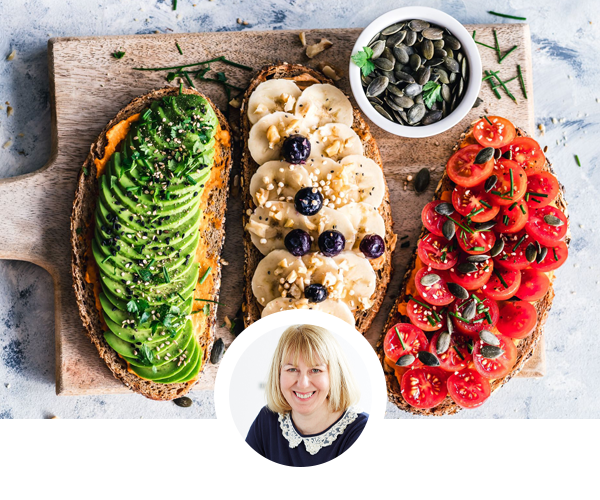MANAGING THE MENOPAUSE THROUGH FOOD

There are a lot of symptoms of the menopause. Some lucky people are relatively unaffected by them and others have a very hard time. One of the reasons for this could be that, if you have had a healthy diet and lifestyle for a while, you are better equipped going into the menopause to manage the transition.
However, even if you haven’t been eating healthily, taking some simple steps to improve your diet will support you and may minimise menopausal symptoms. Generally in life what you eat has a big impact on energy levels, mood, concentration, memory, weight, sleep and stress response. This is always the case but during the menopause this is even more the case.
Not everyone’s symptoms will be the same and there are slightly different actions you would take depending on your particular issues. Having said that, there is a hormone balancing diet, which is a great start point for everyone going through the menopause. The key principles of this are:
- Balance your blood sugar: Eat little and often and have foods that release their energy slowly, wholegrains (brown rice, oats, wholemeal bread), vegetables and include some protein in each meal or snack. Protein does always have to come from an animal source. Nuts, seeds, beans, peas, lentils and chickpeas are great sources and are naturally high in fibre and low in saturated fat.
- Eat plenty of vegetables and some fruit (these provide vitamins, minerals, antioxidants and fibre). Ideally 8 portions per day (5 vegetables and 3 fruit). Some fruits contain a lot more sugar than others – if they taste really sweet that is a good indication that sugar levels are higher. Dried fruit is particularly high in sugar.
- Increase broccoli, cabbage, Brussels sprouts, cauliflower (these contain nutrients which help the liver to detoxify old hormones). These are all very low calorie and can replace some of your carbs in your evening meal to help manage weight.
- Buy organic where possible (fewer antibiotics and chemicals for your liver to process, and grown on more nutrient rich soil).
- Eat beans, lentils, chick peas and soy (contain natural plant oestrogens which can help balance your own oestrogen levels). Don’t go overboard on soy and try to eat fermented forms such as miso, tempeh and tofu. Too much unfermented soy can give you too many plant oestrogens and can also prevent some important minerals from being absorbed.
- Avoid synthetic oestrogen found in cling film especially used to microwave or wrap fatty food. Likewise do not reuse plastic water bottles, or leave them in the sun.
- Eat foods containing good oils like unsalted, unroasted nuts, seeds, cold pressed oils especially olive and oily fish (salmon, anchovies, mackerel, sardines).
- Reduce intake of saturated fats (dairy products, red meat, processed meals and snacks). They interfere with the body’s absorption of good oils. Good oils help balance hormones.
- Drink 2 litres of filtered water a day (helps prevent constipation and removes toxins and old hormones from the body). If you don’t like cold water herbal teas or hot water and lemon/ginger can be a good option.
- Reduce caffeine intake (this can worsen a number of menopause symptoms).
- Keep alcohol consumption to a minimum (this puts a strain on the liver and interferes with blood sugar balance and good oil metabolism). Often alcohol and caffeine combined can tip you over the hot flush edge.
- Avoid sugar on its own and hidden in processed and prepared foods (it can cause weight gain and increase oestrogen production).
Ceri Morgan and Ann Souter: We each have a diploma in Nutritional Therapy and are members of the British Association of Nutrition and Nutritional Therapy and are registered with the Complementary & Natural Healthcare Council. We have been practising in the field of nutrition since 2008.
We see many of our clients on a one to one basis, to help them achieve their health goals through food, lifestyle and supplementation. We also do group sessions with people with similar health interests. This can either be in people’s homes, gyms or in the workplace.
We see at first hand the positive impact that nutrition can have on many your overall sense of wellbeing and particular female health concerns. Even small changes can have a really significant impact. We realise that everyone knows about food. However in the area of healthy eating there is a lot of conflicting advice and information overload. Our goal is to work together with clients to cut through all this, focus on what will benefit them specifically and jointly agree a way forward that is achievable and motivating.
Food is so central to everything we do and is at the heart of most people’s social life. We focus on easy tasty recipes that can fit in with normal life; so that the changes are realistic, straightforward they are also a pleasure.
Visit www.recipeforhealth.co.uk
www.facebook.com/RecipeforHealthUK
Twitter @rfhnutrition